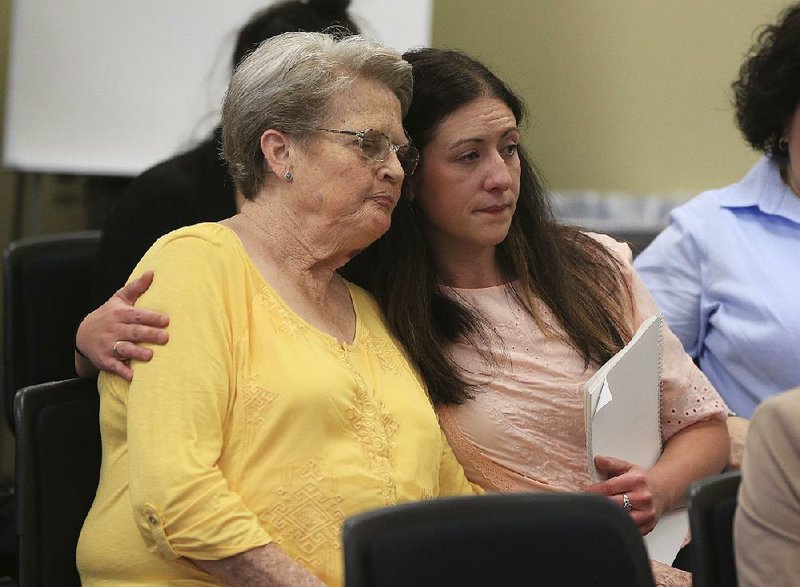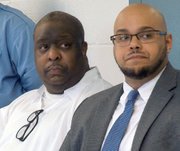The Arkansas Parole Board on Monday released recommendations denying clemency for two death-row inmates and heard arguments on whether a third death-row inmate should be executed.
Gov. Asa Hutchinson can confirm, overturn or choose not to act upon the Parole Board's recommendations.
Nine death-row inmates -- including the eight scheduled to be executed in April -- filed a lawsuit Monday in federal court in the Eastern District of Arkansas against the governor and the prison system leader in an attempt to stop the executions.
In the decisions announced Monday, the board rejected arguments from attorneys for Stacey Johnson and Ledell Lee that the trials that led to their convictions had been flawed. Johnson and Lee have maintained their innocence in the more than two decades they have been on death row. Both are scheduled to be executed April 20.
Johnson, convicted in 1996 of killing Carol Heath in 1993, said during a clemency hearing Friday that Sevier County officials had conspired to frame him, that budget issues affected his appeals and that people who seek to harm him have infiltrated the Varner maximum-security facility where he lives.
Johnson's attorney, Jeff Rosenzweig, said Monday he was not surprised by the board's decision, but he maintained Johnson's trial was flawed.
Johnson and his attorneys have disputed a judge's decision to allow Heath's daughter, Ashley, to testify during his second trial and to prevent her complete psychological records from being presented to the court. Johnson's conviction in his first trial was overturned because of testimony from police that Ashley Heath had identified Johnson as her mother's killer, despite being ruled incompetent to testify at trial.
"The basic petition for clemency was that there were all sorts of problems with this trial," Rosenzweig said.
Five of the seven parole board members recommended denying Johnson clemency. The official decision -- contained in a one-page "executive clemency interview work sheet" released Monday -- concludes that Johnson's death sentence is not excessive, the nature and seriousness of Johnson's offense did not merit clemency, and the injustices alleged also did not merit clemency.
Board member John Belken wrote that he believes Johnson is a threat to society and an "ongoing threat to [Department of Correction] staff" based on his disciplinary record. Dawne Benafield Vandiver and Abraham Carpenter Jr. dissented. Both wrote that the request for clemency had merit and recommended life without parole.
In the case of Lee, six Parole Board members voted to recommend denying clemency, and a seventh -- Lona McCastlain -- recused from the case. Board members are not required to disclose their reasons for recusing.
Belken wrote that he believed Lee "is a danger to society," noting his multiple crimes. The official decision concluded that the nature and seriousness of the crime, the injustice alleged, and the multiple victims were all factors that did not merit clemency.
Lee's attorney, Lee Short, said Friday that not all arguments about judicial decisions made in Lee's trial have been fully vetted on appeal. A representative of Attorney General Leslie Rutledge's office disputed that claim.
Short said Monday that the Parole Board's decision was another event in a long process of unfair hearings and procedures.
"I'm disappointed but in no way surprised by the decision the board reached," he said.
The board is now deliberating the clemency request of Marcell Williams, who presented his case before the board Monday.
Williams was convicted in 1997 of kidnapping, robbing, raping and killing Stacy Errickson. Williams also was convicted of kidnapping and raping two other women within three days of his attack on Errickson, a mother of two small children.
Williams kidnapped Errickson from a gas station, forced her to drive to ATMs throughout Pulaski County, then took her to a storage shed, beat her, raped her and strangled her to death, according to attorney testimony Monday. Williams had chased other women at a different gas station earlier that morning but the women had escaped.
Tammy Harrelson, who was a prosecutor on the case, said she remembers the look on Errickson's face in security footage from the ATMs, when she didn't yet know what would happen to her.
"The fear on her face is something that I still carry with me today," Harrelson told the Parole Board at the victim impact hearing in Little Rock.
Williams apologized Monday for his crimes and discussed his troubled childhood, according to Jason Kearney, a federal public defender representing Williams.
Williams requested clemency on the grounds that he accepts responsibility for his crimes and that he was the victim of "severe childhood trauma," which only one court considered in the various stages of sentencing appeal since 1997.
Williams' trial attorneys did not bring up his childhood -- which reportedly included sexual abuse, beatings, poverty, neglect and being prostituted by his single mother -- back in the 1990s, according to his application for clemency.
A federal judge had granted a new sentencing hearing based on his childhood trauma and determined Williams should be sentenced to life in prison without parole, but the decision was overturned in the 8th U.S. Circuit Court of Appeals because Williams' post-conviction attorneys did not reference the trauma in their Rule 37 appeal, according to the appeal.
Kearney said he wanted the Parole Board to consider his childhood trauma, if a court cannot.
"We hope the board recognizes that and does something to correct it," he said.
Two women testified in support of Williams' clemency application at his hearing Monday morning at the Varner prison: Suzanne Ritchie, his ninth-grade English teacher at Ridge Road Junior High in North Little Rock, and Dina Windle, one of his three rape victims.
Ritchie opposes the death penalty and said she testified Monday that Williams was a normal boy who appeared neglected at home and didn't always have food to eat.
Windle also opposes the death penalty and said she would have testified against a death sentence for Williams 20 years ago. She now lives in New Jersey, where she works as an investigator in a public defender's office. She said after her testimony that she forgave Williams long ago.
"I hope that he finds peace with himself," she said.
Attorneys for the state argued that Williams' crimes were not done out of passion but had been carefully planned because of the women Williams had chased before kidnapping Errickson.
Carolyn Moore, Errickson's mother, and Trista Wussick, the babysitter of Errickson's two children, spoke at the victim impact hearing.
Moore said she didn't think a lack of a father should be any excuse for the way Williams turned out, because her daughter and her twin brother did not have a present father and neither went to jail.
Wussick, who was 12 when Errickson was killed, read a tearful statement to the board about how she remembers the day Errickson disappeared right after dropping her children off at her home. Wussick said she still thinks of her.
"Marcel Williams is my boogeyman," she said. "He doesn't deserve any mercy ... I ask that you deny this monster clemency."
Williams is scheduled to die April 24.

EXECUTIONS: In-depth look at 4 men put to death in April + 3 others whose executions were stayed
Click here for larger versions
The three death-row inmates are among eight people scheduled to die by lethal injection within a 10-day period next month. They would be Arkansas' first executions in 12 years, after years of legal challenges to the state's death penalty and issues with obtaining execution drugs.
RELATED ARTICLES
http://www.arkansas…">Inmates file lawsuit to halt 8 executions
Metro on 03/28/2017

